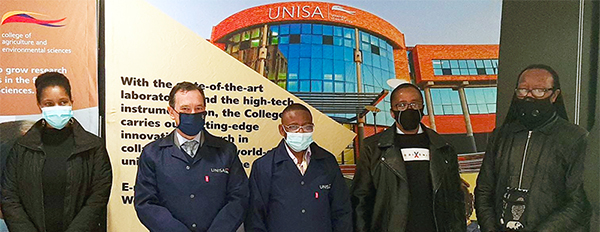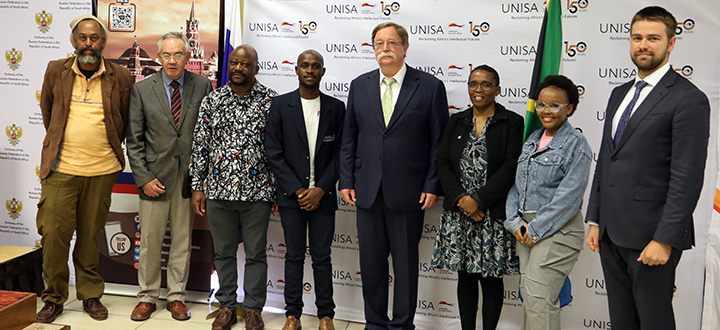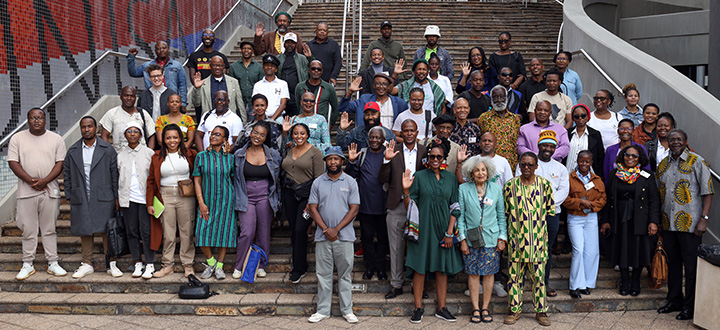College of Agriculture & Environmental Sciences
Art walk attracts the Embassy of Portugal

The Unisa Florida Science Campus Art Walk project uses public art to transform the walkways into areas of relaxation and revitalisation for students and staff. The Portuguese Embassy expressed an interest in the project.
On 29 July 2021, the Ambassador Extraordinary and Plenipotentiary of Portugal to South Africa, His Excellency Manuel Carvalho, arrived with the Counsellor for Culture and Education, Carlos Gomes da Silva, and Social Attaché, Diogo Franco, on a site visit. Apart from the ambassador’s interest in the art project, the aim of the visit was to get a better sense of the campus and to outline the nature of relations between Unisa and the Embassy of Portugal.
According to former South African Ambassador to Eritrea, Prof Iqbal Jhazbhay, Director of Projects (Acting), within the Vice-Chancellor’s (VC’s) Office, the visit was the result of productive consultations the VC held with the Embassy of Portugal over recent months. "Discussions had been held about how to develop catalytic niche areas that Prof Puleng LenkaBula, Principal and Vice-Chancellor, had identified to position Unisa in core areas. Overall, the bilateral relations between South Africa and Portugal," intimated Jhazbhay, "needed to be consolidated and taken to another level."

Dr Tracy Masebe (Acting Chair of Department: Life and Consumer Sciences, College of Agriculture and Environmental Sciences), HE Manuel Carvalho (Ambassador Extraordinary and Plenipotentiary of Portugal to South Africa), Prof Melusi Khumalo (Chair of Department: Mathematical Sciences), Prof Bhekie Mamba (Executive Dean: College of Science, Engineering and Technology) and Prof Jabulani Nyoni (Instrument Scientist, iNanoWS)
"Portugal - the missing piece in the puzzle"
Prof Bhekie Mamba, Executive Dean (ED) of the College of Science, Engineering and Technology (CSET), said: "Significantly, the college spearheaded interactions that are not embedded in memorandums of understanding (MoU) but have driven projects in countries like the UK and Australia. However, the missing piece in the puzzle was Portugal."
Among its many successful collaborations and exchanges, the CSET also supervises scholars from Eduardo Mondlane University in Mozambique. "The Mozambican government funds the students to study at Unisa. Once the students receive their PhDs, they in turn become Unisa’s partners," said the ED. "We must partner with other African universities to keep generating knowledge."
Mamba was accompanied by Prof Melusi Khumalo, Chair of the Department of Mathematical Sciences; Prof Thabo Nkambule, Head of the Institute for Nanotechnology and Water Sustainability (iNanoWS); Prof Jabulani Nyoni, Instrument Scientist (iNanoWS); Dr Tracy Masebe, Acting Chair of the Department of Life and Consumer Sciences, College of Agriculture and Environmental Sciences (CAES); and Prof Sogolo Lebelo, Director of the School of Agriculture and Life Science, CAES. They presented the niche areas that they are already spearheading in the science world.
Unisa, a unique university
Ambassador Carvalho believes Unisa to be an extraordinary and unique university. "You are everywhere and reach out to more than the other universities, which makes you an important academic partner."
He said that Portugal continues to enjoy productive relations with the Portuguese-speaking African countries. "We aim to assist to develop those countries and for that we need Unisa as a partner."
Long-term goals are to partner in oceanography which will be based in the Atlantic Ocean. "This will create the north-south route - a route that the Portuguese travelled into Africa a long time ago," he said.
In seeking to conclude an MoU, further areas for partnership, cooperation and collaboration include identifying synergies in the higher education institutions between Unisa and Portugal. This will include the six Lusophone or Portuguese-speaking African countries in interdisciplinary programmes in life sciences, student exchange programmes, the Portuguese language and literature promotion, the training of Portuguese teachers, increasing research capacity, and a special focus on linguistics, astronomy and marine sciences.
* By Busisiwe Mahlangu, Communications Coordinator, Department of Institutional Advancement
Publish date: 2021-08-11 00:00:00.0

 Unisa's student leadership engage with Russian ambassador
Unisa's student leadership engage with Russian ambassador
 Re-igniting and re-imagining Pan Africanism, Afrocentricity and Afrofuturism in the 21st century
Re-igniting and re-imagining Pan Africanism, Afrocentricity and Afrofuturism in the 21st century
 Young Unisa science stars join elite Lindau Nobel Laureate group
Young Unisa science stars join elite Lindau Nobel Laureate group
 Education MEC addresses Unisa autism seminar
Education MEC addresses Unisa autism seminar
 Seven Unisans nominated for the NSTF-South32 Awards 2023/2024
Seven Unisans nominated for the NSTF-South32 Awards 2023/2024